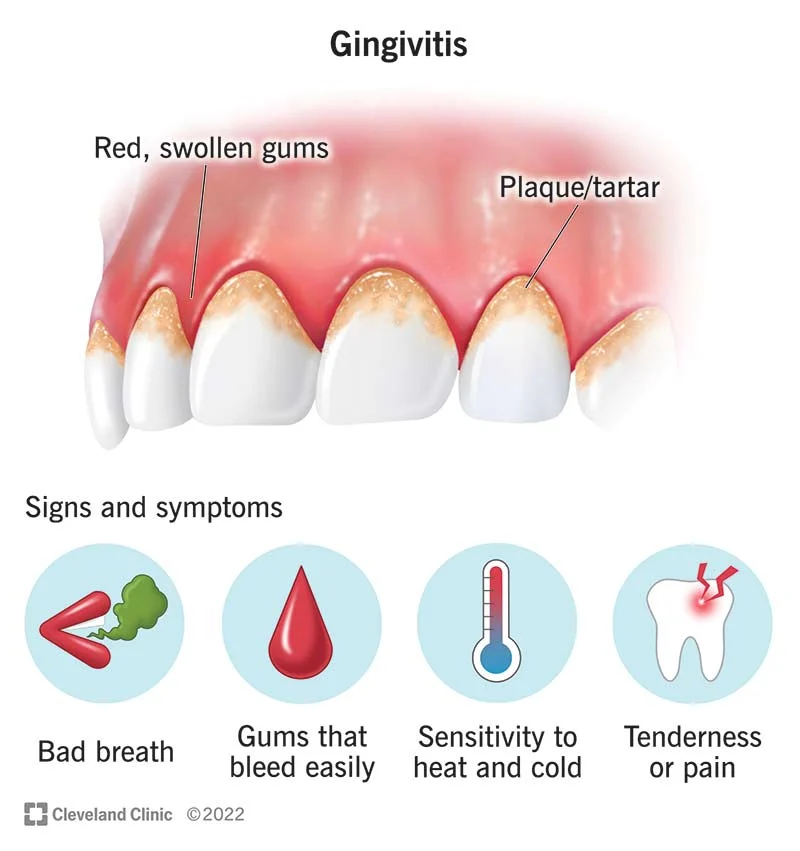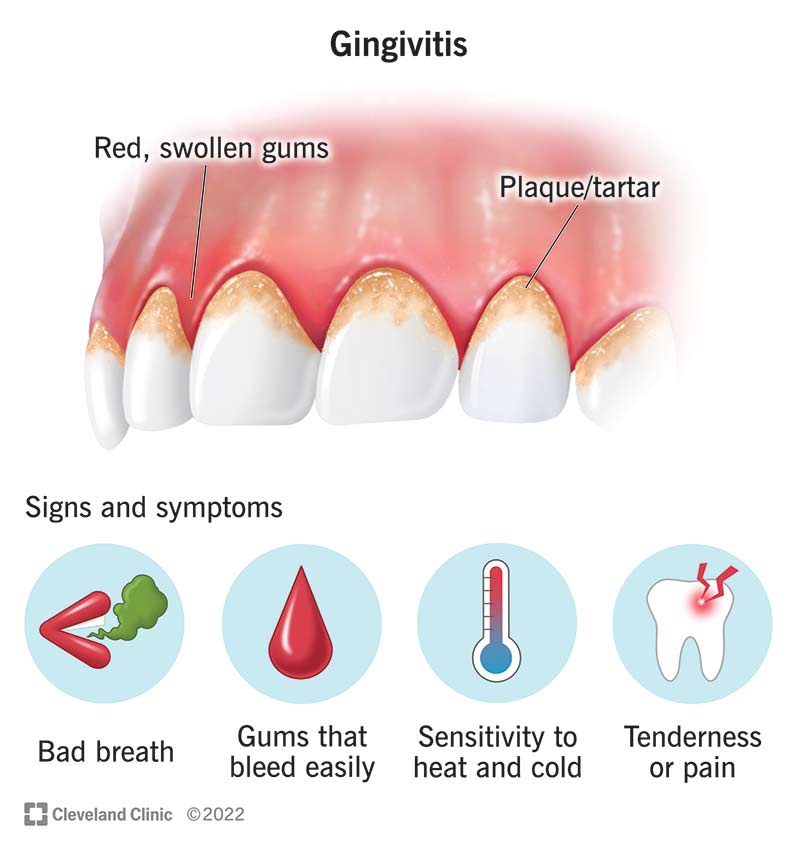
Gum disease is a serious oral health issue characterized by symptoms like swollen or tender gums, persistent bad breath, receding gums, loose teeth, and bleeding gums. Early detection is key to preventing tooth loss and other complications. Maintaining good oral hygiene, including regular brushing, flossing, and dental check-ups, is essential for preventing and detecting gum disease. By staying vigilant and seeking prompt treatment, individuals can effectively manage gum disease and preserve their oral health. Remember, prevention and early intervention are crucial for keeping gum disease at bay and maintaining a healthy smile.
The Signs and Symptoms of Gum Disease
Gum disease, also known as periodontal disease, is a common oral health condition that affects the gums and surrounding structures in the mouth. It is important to be aware of the signs and symptoms of gum disease, as early detection and treatment can prevent further damage and complications. In this article, we will explore the various indicators of gum disease and discuss the importance of maintaining good oral hygiene to prevent its onset.
Causes of Gum Disease
Gum disease is primarily caused by poor oral hygiene habits that lead to the buildup of plaque and tartar on the teeth and gums. Plaque is a sticky film that forms on the teeth and contains bacteria.
When plaque is not removed through regular brushing and flossing, it hardens into tartar, which can only be removed by a dental professional.
The bacteria in plaque and tartar produce toxins that irritate and inflame the gums, leading to gum disease.
Other factors that can contribute to the development of gum disease include smoking, hormonal changes (such as during pregnancy or menopause), certain medications, and underlying health conditions like diabetes.
Preventing and Treating Gum Disease
- Prevention through Oral Hygiene:
- Brush teeth at least twice a day.
- Floss daily to remove plaque and debris.
- Regularly visit the dentist for professional cleanings and check-ups.
- Treatment Options for Gum Disease:
- Non-surgical interventions like scaling and root planing in early stages.
- Surgical treatments like gum grafting or flap surgery in advanced cases.
- These procedures aim to remove plaque, promote gum healing, and prevent further damage to the gums.
In conclusion, being aware of the signs and symptoms of gum disease is crucial for maintaining oral health. Red, swollen, and tender gums, as well as bleeding gums, are common indicators of gum disease. By practicing good oral hygiene and seeking professional dental care, you can prevent the onset of gum disease and protect your smile for years to come. Remember, early detection and intervention are key in maintaining healthy gums and teeth.
The Signs and Symptoms of Gum Disease
- Gum disease can cause swollen, red, or tender gums.
- Bleeding gums, especially during brushing or flossing, can be a sign of gum disease.
- Bad breath that doesn’t go away even with regular brushing and flossing may indicate gum disease.
- Persistent tooth sensitivity or pain can be a symptom of gum disease.
- Receding gums or the appearance of longer-looking teeth can be a sign of gum disease.
Frequently Asked Questions
What are the common signs of gum disease?
When it comes to gum disease, there are several common signs and symptoms to look out for. One of the most noticeable signs is gum inflammation, which can cause your gums to appear swollen, red, or tender. Another common symptom is bleeding gums, especially when you brush or floss your teeth. You may also experience persistent bad breath, which can be a result of the bacteria in your mouth due to gum disease. Additionally, gum recession, loose teeth, and changes in your bite can also be signs of gum disease.
If you notice any of these signs, it’s important to consult with your dentist as soon as possible. Early detection and treatment can help prevent further damage to your gums and teeth.
Can gum disease cause tooth loss?
Yes, gum disease can lead to tooth loss if left untreated. When gum disease progresses, it can cause the gums to pull away from the teeth, forming pockets where bacteria can accumulate. This can lead to the destruction of the supporting tissues and bone around the teeth, causing them to become loose and eventually fall out.
It’s crucial to address gum disease early on to prevent tooth loss. Regular dental check-ups and good oral hygiene practices, such as brushing and flossing daily, can help maintain the health of your gums and prevent gum disease from progressing to a more advanced stage.
Are there any risk factors for developing gum disease?
While anyone can develop gum disease, certain factors can increase your risk. Poor oral hygiene is one of the main risk factors, as it allows bacteria to build up and cause gum inflammation. Smoking and tobacco use can also contribute to the development of gum disease. Other risk factors include hormonal changes (such as during pregnancy or menopause), certain medications that reduce saliva flow, genetic predisposition, and certain systemic diseases like diabetes.
If you have any of these risk factors, it’s important to be extra vigilant about your oral hygiene and schedule regular dental check-ups to monitor the health of your gums.
Can gum disease be reversed?
Early-stage gum disease, known as gingivitis, can be reversed with proper treatment and oral hygiene practices. Gingivitis is characterized by gum inflammation but does not involve bone loss or irreversible damage to the gums. With professional dental cleanings and improvements in oral hygiene, such as regular brushing and flossing, gingivitis can be successfully treated and the gums can return to a healthy state.
However, if gum disease progresses to a more advanced stage, called periodontitis, it cannot be completely reversed. Periodontitis involves irreversible damage to the gums and supporting structures of the teeth. While it can be managed and further progression can be prevented, the damage that has already occurred cannot be undone.
How can I prevent gum disease?
Preventing gum disease starts with practicing good oral hygiene. This includes brushing your teeth at least twice a day with a soft-bristled toothbrush and fluoride toothpaste, as well as flossing daily to remove plaque and bacteria from between your teeth. Regular dental check-ups and professional cleanings are also essential for maintaining gum health.
Avoiding tobacco use and adopting a healthy lifestyle, including a balanced diet and regular exercise, can also contribute to gum disease prevention. Additionally, managing any underlying health conditions, such as diabetes, can help reduce the risk of gum disease.
Final Thoughts on the Signs and Symptoms of Gum Disease
Recognizing the signs and symptoms of gum disease is crucial to prevent further damage and maintain oral health. From bleeding gums to bad breath, these indicators should not be ignored.
Seeking Professional Help
Don’t hesitate to reach out to your dentist for evaluation and treatment if you notice any symptoms of gum disease. Early detection and intervention can prevent complications like tooth loss and systemic health issues.
Prioritizing Good Oral Hygiene
Regular brushing, flossing, and using mouthwash are essential in preventing gum disease. Additionally, scheduling routine dental check-ups helps catch potential issues early on, contributing to overall gum health.
Conclusion: Protecting Your Gums
Awareness and proactive care are vital in safeguarding gum health. By staying vigilant and maintaining good oral hygiene habits, you can prevent gum disease and enjoy a lifetime of healthy smiles. Take care of your gums today to ensure a bright dental future.
Call or Book appointment online
:Ace Dental Care Alpharetta office: 678-562-1555 - Book Now
Ace Dental Care Norcross office: 770-806-1255 - Book Now
Disclaimer
This blog post was generated by artificial intelligence. The content of this post may not be accurate or complete, and should not be relied upon as a substitute for professional advice. If you have any questions about the content of this post, please contact us.
We are constantly working to improve the accuracy and quality of our AI-generated content. However, there may still be errors or inaccuracies. We apologize for any inconvenience this may cause.






